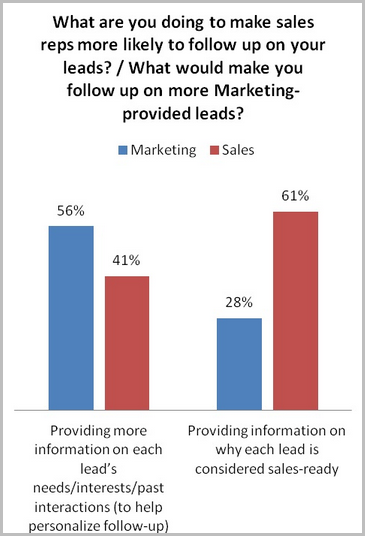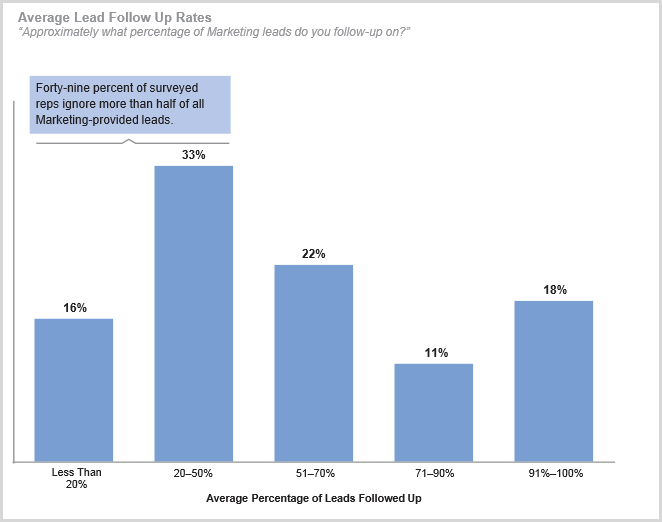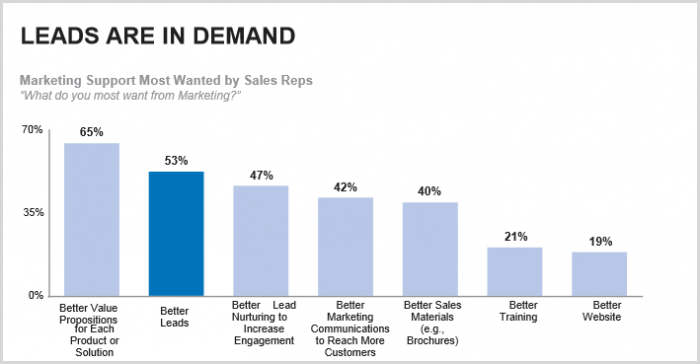In a recent poll, CEB asked sales and marketing professionals why some leads aren’t followed up on, in what ways that’s a problem, and how to fix it. Not surprisingly, the two functions had some differences of opinion. In the blog post Why Leads Die, CEB’s Katie Castagna discusses the issues:
“Each lead is a financial investment and unfortunately many of them end up being ignored, then forgotten, never to be seen again. … Interestingly, both Sales and Marketing seem to agree that information transparency could be better. Marketers generally assume that having more customer information will make Sales more inclined to follow up. But what Marketers clearly underappreciate, is that Sales often wants to know why Marketing considers a lead valuable or sales-ready. While it may seem like a subtle distinction, giving sales the right type of information could be relatively easy and make a big difference to follow-up.”
Let’s take a closer look at the problem
Are you ready for this scary statistic? 49 percent of surveyed sales reps ignored more than half of all marketing-provided leads. Ouch. What’s greater here, the injury or the insult?
However, when sales reps were asked what they wanted from marketing, 53% said theywant better leads from marketing.
And only 3% of the reps said they could generate all the leads they needed themselves.
When asked why sales ignores leads from marketing, the reps replied:
- 30% said they don’t trust marketing’s leads
- 29% said they don’t have enough time to follow up on every lead
- 22% said they need more contextual information to have a productive conversation
Further:
- 67% said fewer leads from marketing actually convert
- 49% said it takes more time for marketing-generated leads to convert
- 41% said it takes more effort for marketing-generated leads to convert
37% of reps agree that their marketing colleagues understand and support sales business needs. 28% are neutral on the issue. Of the balance 35% disagree, with 9% disagreeing strongly.
That’s enough rain for anyone’s parade. What to do?
Alignment is the answer.
Every company needs to define “sales and marketing alignment” for itself, but at a minimum it begins by agreeing on a common lexicon and getting sales’ input into how leads are qualified.
- 64% of salespeople say getting leads that were qualified according to criteria sales had agreed on would give them more confidence about following up on marketing-generated leads.
- 61% of salespeople say they would follow up on marketing-generated leads more often if they had more information about why a lead is considered qualified. Here again, if sales has a seat at the table and can say what “why” means to them, then marketing has an opportunity to fulfill that need.
Paying attention to sales’ desires might change the how, why, where, and when of marketing’s hand-off to sales, but it should also result in better leads, more confidence in those leads, and so more marketing-generated leads being followed up.
There’s a lot to learn about sales and marketing alignment. Act-On’s white paper “Introduction To Integrated Marketing: Sales and Marketing Alignment” gives seven steps, from developing buyer profiles to reviewing success, that can get your teams on the road to cooperation – and profit.
Graphs courtesy of CEB, Why Leads Die, Arlington VA, 2013



